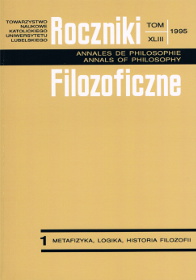Selected Philosophical Aspects of Theory of Performative Utterances
Abstract
In reference to the discussions carried out in Polish and Anglo-Saxon literature, the paper takes up the major philosophical problems implicated by the issue of performative utterances − namely the problem of the criterion of performativity and the problem of the relationship between performatory and descriptive-informatory functions of language. In spite of those philosophers of language who postulate substitution of the theory of performatives by the theory of speech acts (as more general one) the author shares the opinion of those investigators who acknowledge distinct and non-reducable character of the issues that are inspired by original Austinian doctrine of "doing things with words". It is impossible to explain adequately the phenomenon of performative utterances in terms of the speech acts theory because performatives, in contrast to illocutionary acts, depend on additional rules in relation to linguistic ones. Therefore one can speak about illocutionary acts governed by linguistic rules on the one hand, and performative acts governed by specific ceremonial, cultural conventions on the other.
Some performative utterances called "explicit performatives" have a grammatical form typical of statements (simple present tense, first person active voice, indicative mood). There are two main attitudes to this kind of utterances: "cognitivistic" according to which one can assign to explicit performatives truth-false valuation, and "anti-cognitivistic", which opposes the cognitivistic view. Analysis of the contexts of usage of explicit performatives seems to suggest that cognitivistic standpoint is better justified. The author claims that the coexistence of the performatory and descriptive-informatory function of language is possible within one utterance. The discriptive-informatory function of explicit performatives is a "metafunction" in relation to performatory function of this utterance.
Copyright (c) 1995 Roczniki Filozoficzne

This work is licensed under a Creative Commons Attribution-NonCommercial-NoDerivatives 4.0 International License.





